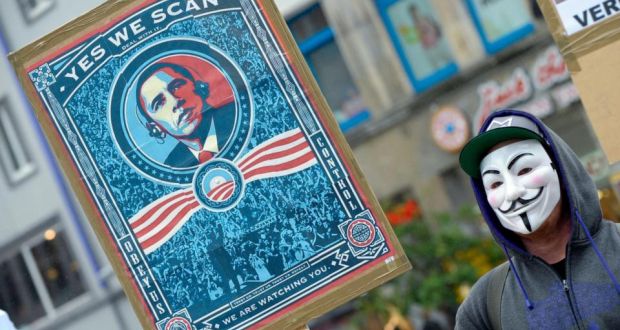Steadily dismantling the definitive legal strides of Warren and Brandeis, the American right to privacy prevails, but increasingly more illusory, amid recent expansions and potentially ongoing abuses of state power. Diminishing transparency between citizens and government is by no means unprecedented, or uniquely American, but actively plagues the U.S. as a dangerous consequence of mounting bi-partisan efforts to dignify the Federal government’s erosion of civil liberties and selective enforcement of the rule of law.
Since ending the established sense of national security, devastating attacks launched against the U.S., on Sept. 11, 2001, ushered in an era fairly representative of contemporary America’s widely-held sentiments of unabashed patriotism, fearful paranoia, and declining trust in government. Additionally, the same act of terror produced a nationally-felt sense of vulnerability, which the U.S. had not manifested collectively, since Japan’s bombing of Pearl Harbor, in 1941.
Carried out by 19 al-Qaeda-linked militants, the successfully executed suicide attacks incorporated four hijacked airplanes, two of which collided with the Twin Towers in New York City and one which flew directly into the southwest side of the Pentagon in Washington, D.C. These attacks killed over 2,750 civilians in New York City, 184 at the Pentagon and 40 in Pennsylvania, where United Airlines Flight 93 crash-landed in a field after the passengers bravely fought to reclaim the airplane from the hijackers.
Despite the fact that the Bush-Cheney administration was priorly warned of viable upcoming terrorist attacks against the U.S., coupled with 2001’s massive $331.81 billion national defense budget, the unbearably frustrating reality remains that the White House responded to the potential threats with callous inaction and a gross lack in transparency, which resulted in the failure to prevent the single atrocity that would ultimately justify America’s longest-lasting war. Regularly presenting intelligence briefings to White House staff members, CIA analysts included numerous memos emphasizing warnings of potential near-future terrorist attacks against the U.S., during the months leading up to 9/11.
In mid-July, 2001, the working head of the CIA’s al-Qaeda unit, Richard Blee, met with then-Secretary of State, Condoleezza Rice, and her team at the White House. Leaving little to the imagination, Blee was adamantly clear in relaying this warning: “There will be significant terrorist attacks against the United States in the coming weeks or months. The attacks will be spectacular. They may be multiple. Al-Qaeda’s intention is the destruction of the United States.” Responding to Rice’s question regarding what actions the agency advises the commander-in-chief to take, Blee, slamming his fist down against the tabletop, exclaimed, “We need to go on a wartime footing now!”
Drastically expanding the most easily corruptible areas of government power, former President George W. Bush’s reactionary signing of the USA Patriot Act of 2001 into law, paved the way for shameless reoccurring abuses of the law’s granted set of overreaching powers. On Oct. 26, Bush delivered remarks about the new landmark piece legislation to members of the press from the White House’s rose garden, saying, “Countering and investigating terrorist activity is the No. 1 priority for both law enforcement and intelligence agencies. … This new law that I sign today will allow surveillance of all communications used by terrorists, including e-mails, the Internet, and cell phones. As of today, we’ll be able to better meet the technological challenges posed by this proliferation of communications technology.”
Providing the federal intelligence community with the widely-debated legal footing for conducting mass surveillance on Americans, without a warrant, or consent, George W. Bush’s Patriot Act was grossly abused by his own administration, as it was under the proceeding Obama presidency. Simply put, the law obliterated citizens’ already-fragile right to privacy. Directly violating the Constitution’s Fourth Amendment, the Patriot Act permitted the government to conduct warrantless searches. The law also egregiously violates the First Amendment, tyrannically subjecting those lawfully enacting their Constitutional rights to freedom of speech and expression, to an increasingly invasive, god-like surveillance state.
Following Edward Snowden’s daring leak of compromising N.S.A. documents concerning government surveillance, to the public in 2013, the agency’s former analyst was declared a threat to national security. Standing as the most significant U.S. intelligence leak in history, key revelations from Snowden’s disclosed findings included an abundance of evidence entailing numerous instances of the government’s unlawful use of its surveillance powers. Writing in his 2018 book, “America: The Farewell Tour,” veteran New York Times reporter and author Chris Hedges writes, “When a government watches you twenty-four hours a day you cannot use the word ‘liberty.’ This is the relationship between a master and a slave. … The 1878 Posse Comitatus Act,” Hedges explains, “which once prohibited the military from acting as a domestic police force, was overturned with the passing of Section 1021 of the National Defense Authorization Act.”
Breaching crucial points of democratic vulnerability, the sweeping legislation maintains little if any regard for its considerable lack of constitutionality. Directly contradicting Section 1021, which, as Hedges later notes, “permits the state to carry out ‘extraordinary rendition’ on the streets of American cities and hold citizens indefinitely in military detention centers without due process—in essence disappearing them as in any totalitarian state.” Claiming that the U.S. is a totalitarian state is less than apparently true, or false, as it warrants a more rigorous debate. However, the claim that the U.S. possesses distinct similarities to the characteristics of totalitarian states, is inarguably true, especially in regard to state surveillance. The more similarities between the two increase probability of national degeneration and swift government adoption of totalitarianism become.
Speaking to a group of around one-hundred wealthy, elitist donors at New York’s Carlyle Hotel, in 2020, then-Presidential candidate Joe Biden delivered some revealing remarks, saying, “I mean, we may not want to demonize anybody who’s made money, … We can disagree in the margins. But the truth of the matter is, it’s all within our wheelhouse and nobody has to be punished. No one’s standard of living would change. Nothing would fundamentally change.”
Biden’s unapologetically honest closing sentence shines a truly expository light at the U.S.’ deteriorating conditions of managed decline. They outline an inherent contradiction within the pseudo-progressive rhetoric promoted by the Biden-Harris campaign, but nothing changing is massively discouraging for the majority of Americans. Appearing in startling data from Pew Research Center, the published findings from September 2020, indicate that only 20% of Americans trust the government. Considering that Biden served as Vice President and chief accomplice to Barack Obama’s formation of the nation’s mass surveillance apparatus, more of the same doesn’t exactly bode well for resolving the present crisis at the U.S.-Mexico border, or developing a robust economic recovery, or effectively negotiating with the escalating threat of China.
According to an article from Foreign Policy, “Over his two terms, Obama has created the most powerful surveillance state the world has ever seen. Although other leaders may have created more oppressive spying regimes, none has come close to constructing one of equivalent size, breadth, cost, and intrusiveness.” Later mentioned in the same article, the government’s reach of surveillance in 2016, had significantly enlarged “from 22,300 miles in space, where seven Advanced Orion crafts now orbit; to a 1-million-square-foot building in the Utah desert that stores data intercepted from personal phones, emails, and social media accounts; to taps along the millions of miles of undersea cables that encircle the Earth-like yarn,” President Obama’s inauguration in 2009.
America’s gradual obliteration of government transparency, constitutional rights, and diligent enforcement of the rule of law are all chiefly responsible for today’s illusion of national participatory democracy. The Chinese Communist Party’s flagship newspaper, the People’s Daily, recently published an article written by a researcher at the China Institute for International Studies titled, “America’s Main Opponent is Itself.” Presenting a fairly compelling case, the article argues, “The United States has arrived at its current situation because the design and operation of its political and economic system has gone awry, the inevitable result of the short-sighted pursuit of profit.”
That article’s assessment of today’s U.S. is concerningly valid and will, unfortunately, only continue deteriorating, if, as Biden said, “nothing will fundamentally change.”














Be First to Comment